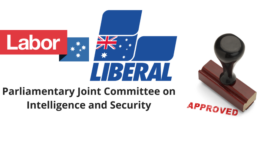PJCIS: Major Party National Security Law Rubber Stamping Club’s Mandate to Broaden

Since 9/11, the Australian government has passed coming up on close to 100 pieces of national security/counterterrorism legislation, with bipartisan approval, that, along with enhancing the security state, has served to whittle away at the basic rights and liberties of all citizens and residents.
The Howard government commenced this national security project, although it was the UN General Assembly that instigated it, on its adoption of Resolution 1373 just seven days after the New York terror attacks, as it called on all states to enact antiterror laws with steep penalties.
And while this UN recommendation was followed by many, Australia has excelled in the volume and reach of its national security laws, with UNSW Law Professor George Williams having explained the chief reason for this being that our nation has no federal legislation enshrining rights in law.
So, with both majors falling over each other to bolster the security state over the succeeding decades, it’s no wonder most of these laws simply traipsed through each chamber of parliament. Although there is a safeguard review process that each bill must undergo to prevent overreach.
Since 2014, those reviews have been carried out by the Parliamentary Joint Committee on Intelligence and Security (PJCIS), which is a body that up until the present has been closed to any nonmajor party members and it, basically, rubber stamps all the proposed laws that come before it.
And while a bit of recent legislative tinkering appears to convey that Labor might be loosening the grip the PJCIS has on our national security laws, another yet to be passed bill suggests attorney general Mark Dreyfus’ ultimate vision for that committee is for its power to be heightened.
Broadening membership
In amongst the laws that serve to bolster the security state contained in the National Security Legislation Amendment (Comprehensive Review and Other Measures No. 2) Bill 2023, which passed this month, is a provision that extends membership of the PJCIS from 11 up to 13 politicians.
Section 28 of the Intelligence Services Act 2001 (Cth) (the IS Act) now states that the PJCIS will comprise of two government and two nongovernment members from both the upper and lower houses. And the other stipulation is that the majority of members must be from government.
Greens Senator David Shoebridge said the Coalition considered Albanese was making the change as a Labor MP had missed a spot on the PJCIS, whilst the “more charitable view” would be that Dreyfus saw “merit in having – at least in appearance – that independence in this oversight committee”.
“There was some discussion in the debate about Anthony Albanese having offered a position to Andrew Wilkie, who has a history of working within the security agencies, so he’s seen as less antagonistic to the institutional players,” the senator told Sydney Criminal Lawyers last week.
During parliamentary debate, Liberal Senator James Paterson expressed outrage that the PJCIS be anything but “a committee of the parties of government”, as he considers it essential for it to “work constructively… in the national interest”, especially due to the classified nature of its deliberations.
The makeup of Albanese’s initial PJCIS came under scrutiny last September when eleven major party members were announced, despite the large swing against the majors at the last election. And even with the amendment, there’s nothing in the law requiring any nonmajor party representation.
The rubber stamp committee
The PJCIS developed out of earlier parliamentary committees. In 1988, the Parliamentary Joint Committee on ASIO was formed. The passing of the IS Act in 2001, broadened the committee’s oversight mandate to include ASIS and the DSD (now the ASD) to form the PJCAAD.
And a 2005 IS Act amendment formed the PJCIS, which saw its oversight broadened to six intelligence agencies: ASIO, ASIS, the ASD, the Australian Geospatial-Intelligence Organisation (AGO), the Defence Intelligence Organisation (DIO) and the Office of National Intelligence (ONI).
From this point onwards, the increasingly prestigious PJCIS chief functions have always been to review terrorist organisation listings, oversee and review the administration and expenditure of the six spying agencies, as well as review briefings, conduct site inspections and produce annual reports.
Indeed, it wasn’t until 2014, when then PM Tony Abbott and AG George Brandis went on a national security-counterterrorism legislating bonanza that the PJCIS became the select major party national security-counterterrorism law review body that it’s remained up until this day.
The PJCIS rubber stamped multiple Abbott bills that broadened the reach of domestic spies, established the metadata regime and foreign fighter laws, whilst rolling out control order regimes, as well as blurring the boundaries between federal law enforcement and intelligence agencies.
And this “thumbs up” approach to rights-eroding security laws continued to see the greenlighting of Turnbull’s espionage and foreign interference measures, Morrison’s encryption-busting laws, as well as turning Dutton’s desire to set foreign spying agencies on domestic targets into a reality.
The three oversight bodies
The PJCIS rose to prominence under the last decade of Coalition rule. And some had hoped that the coming of federal Labor would see a pulling back on the terror and security measures that have led our nation to be considered the most secretive democracy on the international stage.
And even though the recent change to PJCIS membership does serve to continue to buoy up these hopes of reform to some degree, there is another piece of national security legislation before federal parliament that’s likely to dash these away.
Currently, there are three bodies that serve to provide oversight to the nation’s intelligence agencies and the laws governing them, which are the PJCIS, the Inspector General of Intelligence and Security (IGIS) and the Independent National Security Legislation Monitor (INSLM).
Established in 1986, the IGIS is an independent statutory office holder providing oversight to the same six spying agencies that the PJCIS monitors, although the inspector oversees their activities to ensure that these agencies comply with the law, ministerial guidelines and respect rights.
The INSLM is an independent statutory body, making up the third part of this regime. Operating since 2011, it reviews national security and terrorism laws to ensure they’re running in an effective way, that they don’t impinge on individual rights and that they remain proportionate to any threat.
Government-overseen independence
However, the Intelligence Services Legislation Amendment Bill 2023 (the IS Amendment), introduced into parliament in June, seeks to provide the government-run major party-stacked PJCIS with the authority to oversight and command the two independent national security watchdogs.
The first change the IS Amendment makes is to broaden the jurisdiction of both the PJCIS and the IGIS, so they cover the entire National Intelligence Community (NIC), which comprises of the six intelligence agencies they already monitor, along with four more bodies.
These additional agencies include the Australian Criminal Intelligence Commission (ACIC), the Australian Federal Police (AFP), the Australian Transaction Reports and Analysis Centre (AUSTRAC), and the Department of Home Affairs (Home Affairs).
So, with these additions agencies forming the NIC, there is a further bipartisan-approved blurring of the borders between law enforcement and intelligence agencies at the federal level.
The new laws would further the reach of the PJCIS so that it can review any proposed national security or counterterrorism law reforms, including those about to expire, of its own accord, so it can “provide appropriate scrutiny in this complex and constantly evolving intelligence environment”.
In a sign that independent oversight is about to shrink further, the major party PJCIS members will be able to require the IGIS to conduct an inquiry into “the legality and propriety of particular operational activities of the agencies” within its jurisdiction and then report back to the committee.
If the IGIS fails to provide the report, it must notify the PJCIS of the reasons why it hasn’t, while if the IGIS does produce one, the committee can then provide it with advice, which clearly indicates that the government committee will now hold senior ranking to that of the IGIS in this oversight regime.
And along with its preexisting ability to require the INSLM to undertake a review, the committee will now have the ability to order the IGIS to provide briefings as well. So, again the PJCIS will be in a position of authority that allows it to order both independent watchdogs to produce reviews for it to scrutinise.
“The task of the parliament is to strike a balance between the protection of Australia’s essential security interests and the preservation of essential rights and freedoms,” Dreyfus said during his 22 June second reading speech on the bill.
“Critical to achieving this balance is strong and effective safeguards and oversight,” the nation’s chief lawmaker added.
Yet, the AG failed to make clear that to preserve our free and democratic society, he’ll soon require a select group of “parties of government” members, the PJCIS, to act as a watchdog overseeing the independent bodies that are supposed to provide oversight free of government interference.
The IS Amendment Bill is currently under the review of the PJCIS.







